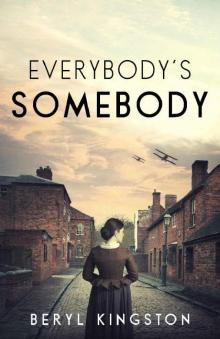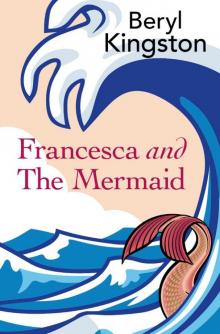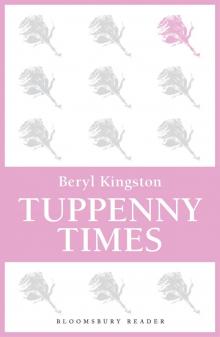- Home
- Beryl Kingston
Everybody's Somebody Page 6
Everybody's Somebody Read online
Page 6
She came into their sitting room on Friday to clear their coffee cups and found them in the middle of a languid conversation that made her feel quite cross.
‘It’s so presumptuous,’ Nicholas was drawling. ‘The man’s a pleb. What does he know about government? Have you read this?’ He quoted from the paper he was holding.
‘“If today there is a kindlier social atmosphere it is mainly because of twenty-one years’ work of the ILP.” What rot!’
‘They don’t know any better,’ Anthony told him. ‘One can’t expect intelligence from the working classes. I’m off to get dressed. We said we’d meet old Pongo at one and it’s nearly that now. Come on.’
They trailed out of the room without giving Rosie a glance. They’re so superior, she thought angrily, so arrogantly sure of themselves. And because she was cross, she picked up the paper and read it at the page Nicholas had left open. It was an account of a speech someone called Keir Hardie had made at some meeting or other and it was a revelation.
‘I shall not weary you by repeating the tale of how public opinion has changed during those twenty-one years,’ he’d said. ‘But, as an example, I may recall the fact that in those days it was tenaciously upheld by the public authorities, here and elsewhere, that it was an offence against laws of nature and ruinous to the state for public authorities to provide food for starving children, or independent aid for the aged poor. Even safety regulations in mines and factories were taboo. They interfered with the “freedom of the individual”. As for such proposals as an eight-hour day, a minimum wage, the right to work, and municipal houses, any serious mention of such classed a man as a fool.’ (And wasn’t that exactly what that silly little boy had just said?) ‘That was the political, social and religious element in which our party saw the light. If today there is a kindlier social atmosphere it is mainly because of twenty-one years’ work of the ILP.
‘The warming influence of Socialism is beginning to liberate people, frozen and hemmed in by a cold, callous greed. We see it in the growing altruism of trade unionism. We see it, perhaps, most of all in the awakening of women. Who that has ever known woman as mother or wife has not felt the dormant powers which, under the emotions of life, or at the stern call of duty are even now momentarily revealed? And who is there who can even dimly forecast the powers that lie latent in the patient drudging woman, which a freer life would bring forth? Woman, even more than the working class, is the great unknown quantity of the race.’
He’s right, she thought. I don’t know who he is, but I understand exactly what he’s saying. It’s what I’ve been thinking ever since I been at work. He’s right about working people toiling unceasingly and how greedy the nobs are and he’s right about women. We are ‘the great unknown quantity’. It was as if someone had switched on a light in her mind. I’m one of the patient drudging women, she thought, and I’d certainly like a freer life. She took out the page, folded it carefully and put it in the pocket of her apron.
Anthony and Nicholas lounged around at the cottage for the next nine days while Rosie waited on them hand and foot, brought up their warm water in the mornings, learned how to cook them meals on their impressive gas oven, cleaned up after them, read their newspapers when they were out sailing and spent a lot of time thinking. On their second Sunday evening they changed into their Eton uniform and their important car arrived to drive them back to their prestigious school. Rosie stood on the doorstep to wave them goodbye.
‘Toodle-pip!’ Nicholas called to her. ‘Back on Friday. Get us a chicken for our dinner will you.’
Then they were gone.
Rosie was glad to see the back of them. Her five work-free days beckoned to her like sunshine. I shall have time for all sorts of things now, she thought. I can visit Ma an’ the littluns. Wash my hair. Have a bit of a rest. Read that speech again maybe. She went to see her mother as soon as she’d cleaned the cottage the next morning, and that afternoon she washed her unruly hair and sat in the garden to dry it in the sunshine while she read Keir Hardie’s speech with careful attention. By the end of the week she’d read it so often she knew it by heart.
It was a beautiful summer. The warm days followed one after the other with barely a cloud in the sky and by the middle of June a good harvest was plainly well on its way. John Goodison said it was the best growing season they’d ever had. ‘Even better’n last year’s, an’ that’s sayin’ something.’
The two Eden boys spent most of their time out of doors in the sunshine, either lolling about in deck chairs, reading their papers and drinking lemonade, or out on their bicycles. They were easy enough for Rosie to look after now she’d got into a routine, although she found their conversations incomprehensible, for they talked about themselves and their friends and another world that was totally foreign to her. Anthony had been to watch his older brother play in the Subaltern’s Cup, whatever that was, at Hurlingham, wherever that was, and he and Nicholas told one another that they were going to join the Twelfth Lancers too because they were a fine body of men. In their third week, Anthony went to a camp of some kind with the Eton College OTC and came back talking about war.
‘There’s one coming,’ he told his brother, looking very pleased with himself. ‘There’s no doubt about that. Ranger says the Russians are mobilising.’
‘Oh well, that’s likely then,’ Nicholas drawled, as if he knew all about it. ‘Shall you join the army?’
‘Naturally,’ his brother said. ‘I wouldn’t want to miss the show for all the world. The adjutant says it’s unlikely because the City would never allow it. But I’m not so sure.’
‘If you go, I shall,’ Nicolas said. ‘It’ll be a lark.’
Behind them in their peaceful garden, the flint walls were richly coloured in the sunshine, the rose bushes heavy with flowers and a blackbird was singing his fluent summer song from the topmost branch of the apple tree. Rosie picked up their dirty coffee cups and their smelly ashtrays and carried them into the kitchen. How can they sit there talking about war and what a lark it is on a day like this? she thought. They’re like silly little boys. She remembered Tommy pointing a broom handle at the gooseberry bushes when he was about six and shouting Bang! Bang! You’re dead! And now here he is tending the gardens and as happy as Larry. Well I hope these two will grow up half as good. Although as she frothed up the soap to wash the cups, she very much doubted it. They were a breed apart.
But they were right about the war. On June 28th Anthony’s newspaper had a big black headline saying ‘Hapsburg Heir Assassinated in Balkans’. He was very excited by it and read the article avidly.
‘There you are!’ he said to Nicholas. ‘The war will start now. It’s bound to. We can’t allow some fanatical Serb to shoot the Archduke Ferdinand. Read that.’
Nicholas read with mounting excitement, growing pinker by the second and Rosie put their breakfast on the warming plates as slowly as she could so that she could watch them. ‘I say!’ he said when he set the paper aside. ‘Now the fur will fly. Killed by a single bullet they say. And his wife too. Imagine that. Have we got kidneys Miss Goodison? I could rather fancy a kidney this morning.’
‘Kidneys, bacon, tomatoes, poached eggs,’ Rosie reported, pointing to each serving dish in turn. ‘I’ll just get your coffee.’
They were in the middle of an excited discussion when she got back, about how they could leave school for a month or two and get a commission in the army.
‘You are much too young,’ Anthony was saying, ‘and that’s all there is to it. You’ll have to wait until you’ve turned sixteen.’
‘It could all be over by then,’ Nicholas complained. ‘I’ll bet I could get into the Royal Navy. They’d take me.’
‘Not at fourteen they wouldn’t,’ Anthony said. ‘Unless you want to be a midshipman.’ Then he turned to Rosie. ‘Ah. Is that the coffee?’
So she had to put the coffee pot down and leave them to their talk even though she was itching to know what they would say next. There couldn�
�t really be a war. Could there? I’ll get hold of that paper the minute they go out and see what it’s all about, she promised herself. Which she did.
It didn’t enlighten her at all, although it gave her all sorts of details about the assassination. There was even a picture of the murdered man, sitting in his carriage with a hat like an upturned coal scuttle on his head and a plump wife sitting beside him with her lap full of flowers. They said his name was Archduke Franz Ferdinand and that he was the heir to the Austro—Hungarian empire, whatever that was, and that the man who’d shot him was nineteen years old and a Serb, whatever that was, and he’d done it because he wanted to take ‘revenge for the suppression of the Serbian people’, and that it had happened at a place called Sarajevo which as far as she could make out was the capital of Bosnia, wherever that was. But there was nothing anywhere in the paper to tell her why England should be going to war because of it. Why should we? If some young man kills some old archduke on the other side of the world, that’s their affair and they should deal with it. Anyway she had a kitchen floor to scrub.
The newspapers became steadily more hot and excitable. The kaiser had ‘reaffirmed his alliance’ with Austria, the Serbs were mobilising, the Royal Navy was on ‘standby’, the tsar had ordered the mobilisation of over a million troops, and at the end of July they fizzed with the news that Austria had sent an ultimatum to Serbia which she couldn’t possibly accept without ‘impairing her sovereignty’. Rosie didn’t have the faintest idea what they were talking about and wished they’d write in English, but Anthony and Nicholas were sure that war was only a matter of days away. And it was.
On August 4th the headlines announced that Britain had declared war against Germany and there were pictures of ardent young men marching along in the streets of London, waving their boaters and cheering. She couldn’t make any sense of it at all. But it had triggered a mood of frantic excitement and the recruiting sergeants were out in force all over the place, determined to take advantage of it. One splendid specimen turned up in East Lavant with a very loud pipe band to announce his presence and call the young men of the surrounding villages to arms. And the young men were duly called and left their farms and their families to hear what he was going to say.
He took up his position beside St Mary’s church at East Lavant, right in front of the school they’d all attended when they were little, and they gathered around him open-mouthed and wondering in the easy sunshine. He was an impressive vision in a bright red coat and the biggest, blackest boots that Tommy Goodison had ever seen.
‘I come ’ere,’ he said in a very loud voice, ‘I come ’ere young feller-me-lads, for to hoffer you the chance of a lifetime. That’s what I come ’ere for to hoffer. The chance of a lifetime. All you got for to do is to sign this ’ere form an’ the harmy’ll make ’eroes of you ’fore you can blink an eye. ’Eroes, I ain’t a-kiddin’ of yer. ’Eroes. Don’t you make no mistake about it.’
The local feller-me-lads stood in their subdued semicircle before him and listened enraptured. Tommy couldn’t make much sense of the harangue but he was bewitched by the sergeant’s red cheeks and pouter-pigeon chest and listened avidly, gradually imbibing the notion that he was being offered a job that would make a man of him or ‘an ’ero’ and that all he had to do to acquire such an admirable status was sign ‘this ’ere piece a’ paper what I’m a-holding in my ’and.’
‘What d’you think Charlie?’ he whispered to his friend. ‘Shall we do it?’
Charlie was smaller and slower witted than Tommy Goodison, so he looked upon him as an older brother and admired him very much. ‘Will you do it, our Tommy?’ he said.
‘I think I might,’ Tommy said. The excitement of entertaining such an idea was making his cheeks almost as red as the recruiting sergeant’s. ‘I mean to say, Charlie, it ’ud be a good life. See the world, good grub, be an ’ero. Hush up. He’s off again.’
‘So what d’yer say boys?’ the sergeant boomed. ‘Are you comin’ with us or what? You’d better make yer minds up sharpish ’cause I’m a-tellin’ yer it’ll all be over by Christmas. All you got ter do is ter walk into this ’ere recruitin’ hoffice — wot used to be your school so they been a-telling me, an’ what more fittin’ place? — this ’ere recruiting hoffice an’ take the shilling. It’s as simple as that.’
‘Shall we do it, our Tommy?’ Charlie asked again.
Some of their friends were already walking to the school door and forming a queue. Their eager movement made up Tommy’s mind for him. ‘Yes,’ he said, walking after them. ‘Let’s.’
‘Let’s ’ave a cheer fer our brave boys,’ the sergeant said, beaming round at the crowd. ‘’Ip,’ip, pip!’
Their neighbours cheered them into the building. They were swollen with the pride of being so special.
Back in the cottage the two Eden brothers were sitting in their dining room, sulking. They’d had a letter from their mother that morning and they were not pleased.
‘It’s so ridiculous,’ Nicholas said, crossly. ‘It’s not as if we’re asking to leave school or anything silly like that. We just want a term’s leave that’s all, to serve our country in her hour of need.’
‘The one thing you have to accept,’ Anthony explained, as much to himself as his brother, ‘is that the Mater’s word is law. If she says we’re not allowed to go, we’re not allowed to go. I can’t see the sense in it either, but we don’t have an option.’
Nicholas threw his table napkin onto his plate and scowled hideously. ‘I wish you weren’t being so deucedly calm about it,’ he complained. ‘It’s deucedly unfair.’
‘Yes,’ Anthony agreed. ‘It is. But she can’t stop us for ever. If it goes on past Christmas, I shall make enquiries about a commission and if it’s still going on when I leave school, I shall volunteer without telling her.’
‘That’s years,’ Nicholas said. ‘It’ll never go on for years. We need to enlist now, or we shall miss it. Why can’t she see reason?’
Anthony changed the subject. ‘I’m off to Bosham,’ he said. ‘Spot of sailin’. Are you up for it?’
Nicholas rolled his eyes. ‘Well at least she can’t stop us doing that,’ he said.
Rosie watched them cycle off from the open kitchen window. She’d overheard most of their conversation and been amused by it. It pleased her to think that these two arrogant young men could be put down by their mother. It showed there was still some justice in the world. She was picking up the tray ready to clear away after their lunch when she became aware of a shadow in the window and turned her head to see her own mother looking in at her.
‘Your brother’s gone for a soldier,’ she said. ‘Mrs Taylor’s just come an’ told me. Him an’ Charlie both.’ Her eyes were shining, and her face was flushed with excitement.
It’s a fever, Rosie thought, all this silly talk of war. She didn’t know whether to be cross with her brother for being so foolish or sorry for her mother for being caught up in the nonsense. But she swallowed her feelings and managed not to say anything that would upset her.
‘Come in for a minute,’ she said, feeling pleased with herself for being so calm, ‘an’ I’ll make us some tea.’
War fever grew all through the rest of the summer. Charlie and Tommy got their orders within five days of joining up and went off to some camp or other on a train packed with young men all looking pleased with themselves and waving goodbye to the relations who’d come to see them go.
‘He’ll be all right, won’t he, our Rosie?’ Maggie said as they walked back to Binderton. It had upset her to see him go, proud though she was of him. ‘I give him a rabbit’s foot to keep him safe.’
‘Yes, course,’ Rosie said. ‘He’ll enjoy it. You’ll see.’
And sure enough he wrote to them four days later to tell them that the grub was good and that they were ‘larning’ him to fire rifles ‘wot is easy’ and that he was living under canvas ‘wot is good sport’. They wrote back at once to tell him to look after himself becau
se they couldn’t think of anything else to say and then there was a long pause when they heard nothing.
The newspapers, on the other hand, were yelling the news at them every day in huge alarming headlines. On the day war was declared, they reported that the German army had invaded Belgium and two days later they spread the news that Austria had declared war on Russia, and that Serbia had declared war on Germany.
‘So it’s spreading,’ Anthony said, giving the paper a satisfied shake.
His brother nodded. ‘We knew it would,’ he said. ‘If only the Mater would let us go. She must see the need now, surely to goodness with all this going on. Shall we try writing to her again?’
But Anthony thought not, even when the reports from France grew steadily more alarming. Liege was captured on the sixteenth and the French army was retreating, which Nicholas thought was ‘a damned bad show’. But he cheered up the next day when the papers were full of the news that the British Expeditionary Army had landed in France.
‘Not before time,’ he said. ‘It’s no good running away. You have to stand up to the Hun. Show a bit of steel. We shall see some changes now.’
What they saw was a British defeat at a place called Mons. The word defeat was skilfully avoided but it was obvious what had happened because the British army were said to have ‘fallen back to defensive positions’ and what was that but a retreat?
‘What’s the matter with them?’ Nicholas said, passionately. ‘Why don’t they stand and fight? That’s the way to deal with the Hun. I thought everybody knew that.’
But it was soon admitted that the Germans had actually captured Mons and, not long after that, news came through that they’d captured Rheims, Ghent, Bruges and Lille as well, and were advancing towards Paris. There seemed to be no end to the defeats the French and English armies were suffering, huge though they were. But when the German army reached the River Marne at the end of the summer their run of conquests was brought to a halt and they were driven back.

 Everybody's Somebody
Everybody's Somebody Sixpenny Stalls
Sixpenny Stalls Francesca and the Mermaid
Francesca and the Mermaid Avalanche of Daisies
Avalanche of Daisies Tuppenny Times
Tuppenny Times A Time to Love
A Time to Love Octavia's War
Octavia's War Gemma's Journey
Gemma's Journey London Pride
London Pride Gates of Paradise
Gates of Paradise Octavia
Octavia Off the Rails
Off the Rails Maggie's Boy
Maggie's Boy Fourpenny Flyer
Fourpenny Flyer